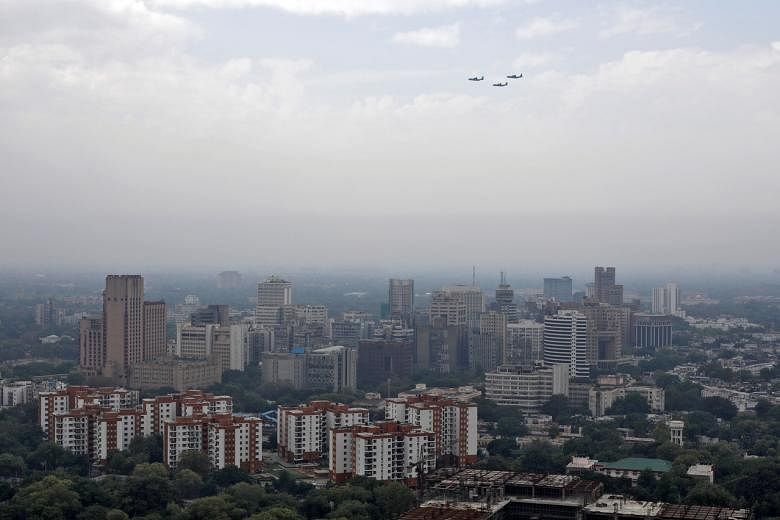BANGALORE - India's Environment Ministry has been taking momentous decisions about large-scale industrial projects over short video calls as officials take their work online amid the country's lockdown. The sweeping changes have alarmed climate change experts.
Official expert panels that advise the government on whether to clear industrial projects based on their potential harm to the environment, forests and wildlife have been doing their work online since the lockdown to prevent the spread of the coronavirus began on March 25. This has continued unabated even though the lockdown has been eased this month with buses and full rail services running again and some shops reopening.
Examining environmental impact assessments, reviewing concerns raised by affected people, and assessing mitigation plans properly usually require field visits and extensive consultation. But the panels have been squeezing these discussions into as short as 10 minutes per project over video calls.
"Only the project proponents are called to participate in these discussions. It's a format that does not give an opportunity to the affected parties to give their inputs, and even if they are called upon to participate, they may not have access to the technology," said environmental researcher Kanchi Kohli, referring to local conservationists and tribal representatives who may want to be involved.
The Environment Ministry gives three kinds of permits: for industrial projects that may impact air, water and soil; to divert forests; and to operate near protected wildlife.
Since the lockdown, the ministry website shows that panels have cleared 49 industrial projects. Fifteen other projects to lay transmission lines, highways and canals in areas with protected wildlife were approved this month. It also approved 182 projects that will raze forests - 49 of them just this week.
The approved projects include a controversial plan to build a new Parliament complex in Delhi, a coal mine in an elephant reserve in Assam, and a limestone mine near the Gir national park established to protect Asiatic lions.
On the anvil are a highway through a wildlife sanctuary in Goa, a uranium exploration project in a tiger reserve in Telangana and a large hydropower project in Arunachal Pradesh opposed by many local indigenous people.
The Environment Ministry has tweeted that the video-conference meetings are needed "for seamless economic growth" during the pandemic. Mr Prakash Javadekar, the Minister of Environment, Forests and Climate Change, is also Minister of Heavy Industries.
Since July 2014, the ministry has approved 2,286 of the 2,480 proposals that it received for environment clearance. That is an approval rate of 92 per cent.
Last month, nearly 300 environmentalists wrote to Mr Javadekar asking him to withhold clearances during the pandemic. They warned: "The appraisals and assessments for clearance are being reduced to an empty formality… we urge you to consider our requests and carry out the intended mandate of the Ministry, which is the protection of India's forests, wildlife and natural heritage and not fast-track clearance of projects."
Mr Jairam Ramesh, an opposition MP who heads a parliamentary panel on environment, forests and climate change, has called for a pause on new clearances. In a letter to Mr Javadekar, he wrote: "Under normal circumstances, these clearances should cause worry; that they have been given during the lockdown period is atrocious."
"Quick reviews are not new," said Ms Kohli, but "in the name of efficiency we are taking decisions faster, instead of assessing the viability of projects under an acute economic slowdown".
Despite surplus coal reserves and low power demand, the government has approved more coal mining in ecologically sensitive areas to energise the economy.
Mr Navroz Dubash, who researches energy and climate change at the Delhi-based Centre for Policy Research, said: "Instead of prioritising dirty, old and inefficient coal-powered plants again, India should see the lockdown as an opportunity for a long-term structural shift away from dirty thermal plants to cleaner coal and renewable energy. If we do this, we will need less coal in the future."
Even if highways, railway lines, mines and malls criss-cross sanctuaries and coastal zones, said environmental lawyer Ritwick Dutta, India will not achieve double-digit growth. "The economic advisers of the government never factored in cyclones, droughts, floods and now the Covid-19 pandemic," he said.
The Environment Ministry is also planning to change rules on how the environmental impact of infrastructure projects is assessed. The proposed new rules would exempt more projects from having to consult people whose lives they could affect. The rules also seek to decrease monitoring of approved projects and increase the duration of clearance permits.
The proposed rules also say that projects which have previously violated environmental rules can continue to operate after paying a fine if they can "run sustainably" with "environmental safeguards". Environmental activists fear that this would reward violators and weaken already fragile protections.
The draft rules are open to public comments till June 30.


